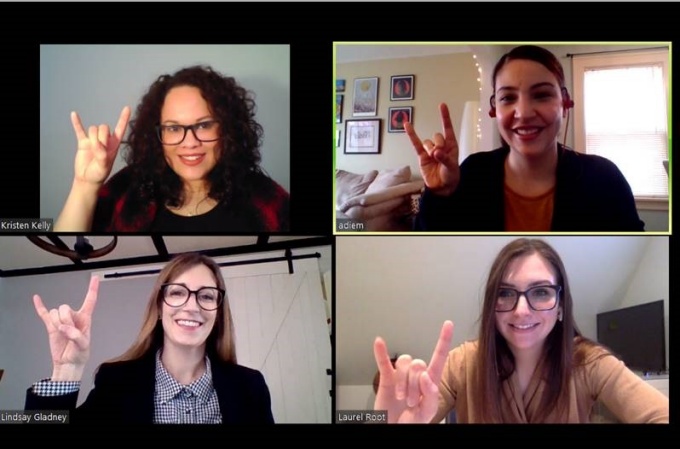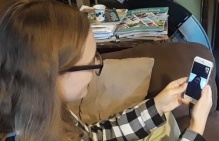
The law school's Office of Admissions gives a UB proud "Horns Up" as we move swiftly to transition to online operations.
Nimble moves to provide continuous service
“None of us could have predicted that we would need to make this transition so quickly,” says Dean Aviva Abramovsky. “But we are rising to the challenge, as Buffalo always does.”
Each spring, the School of Law’s admissions department invites to campus all the students who have been admitted to next year’s entering class. They meet with faculty and current students, tour O’Brian Hall and generally spend a day imagining their future at UB School of Law.
This year, it’s all happening – but potential members of the Class of 2023 will get the whirlwind tour online.
Virtual Admitted Students Week is just one of the many adjustments that the law school is making to minimize disruption to its programs and initiatives.
Vice Dean for Admissions Lindsay J. Gladney, says the goal of the week is “to convince them that Buffalo should be their top choice or one of their top choices.” Toward that end, admitted students have been invited to a series of online events during the week beginning April 20. “Everything will be virtual,” Gladney says. “The students can opt into some live sessions that we’ll host, or they can go to our website later and find a recording.”
The program includes a Zoom webinar – “You’ve Been Admitted, Now What?” – hosted by Gladney where students can ask questions in real time. Among the other elements will be a faculty panel; a financial aid presentation; an online social with alumni as well as an alumni panel discussion; and a sample law school class taught by Professor Kim Diana Connolly on restorative justice. Manager of Recruitment and International Enrollment Services Laurel Root is working with students and staff to put together a virtual tour of O’Brian, with still photos and narration.
All this comes in addition to a dedicated Facebook group for the Class of 2023. Also, Gladney says, the law school has extended its tuition deposit deadline to May 6 – usually April 15 – to give admitted students more flexibility. Meanwhile, the admissions team is staying in touch with students, including scheduling Zoom-based virtual office hours.
The work of the Career Services Office is also proceeding apace, reports Vice Dean for Career Services Lisa Patterson. “The Career Services Office continues to counsel students, review resumes and conduct mock interviews over the phone and via Zoom,” Patterson says. “We know that uncertainty over students’ summer and post-graduation plans causes them great anxiety, and we’re committed to being readily accessible to students."
Career guidance by CSO via Facetime.
“We are also offering virtual interview services to all employers who will be hiring summer interns or new graduates,” says Associate Director Marc Davies, who is working actively with both employers and students as they adapt their plans for the upcoming summer. “Maintaining communications and relationships is essential right now—and the message to both recruiting contacts and students is to be in touch, even where plans are still in development.
“It is inspiring to see the efforts being made to adapt summer programs and onboard law clerks and interns. Where there is a new opportunity for a student to work, especially remotely, we are engaging the students who are looking.”
In addition, Patterson says, CSO staff are working closely with the Law Alumni Association to enhance mentorship and networking opportunities, and providing enhanced training materials on conducting virtual job searches and interviews.
For students in the midst of externships and final-semester 3Ls serving as Pro Bono Scholars, the law school has helped them to pivot to meaningful legal work when face-to-face representation isn’t possible. Vice Dean for Social Justice Initiatives Melinda Saran has been working the phones to make that happen.
The law school’s 11 Pro Bono Scholars, Saran says, all took the bar exam in February but may need to wait longer than usual for the results. And their pro bono placements, typically with legal services organizations, have transitioned from client representation to document drafting, and research and writing projects.
Students taking externships, Saran says, were the real challenge – one-third lost their placements because the courts are not in session. Some of their supervising judges were able to recast the externship around research and writing projects. For a handful of students for whom that wasn’t possible, Saran called her former colleagues and former students in legal services organizations. “You always have these projects you wish you had a law student to work on – can you send me a list of those?” she asked. Then she played matchmaker to identify meaningful work for the remaining externs, including one student who had been hoping for a placement in state appellate court and landed one in the shuffle.
The online classes she conducts with the students, Saran says, had to be tweaked as well, partly to make the reflection questions relevant to their current experience. And for both students and administrators, the whole experience has reinforced the power of resourcefulness in adapting to unpredictable times.
